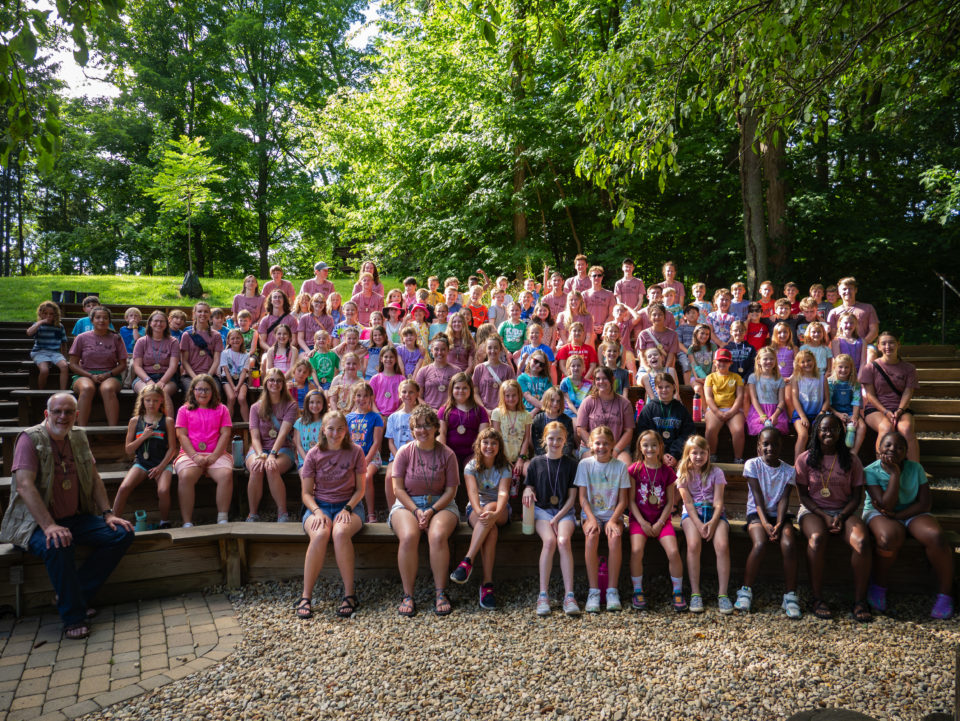David Moser is pastor at Southside Fellowship (Elkhart, IN) and spent a week in the peaceful woods during Pre-Junior Camp. The following is a reflection from his time with us this summer.
Pre-junior campers come to Camp Friedenswald fresh out of 2nd and 3rd grade, their eyes beaming with excitement.

At the first campfire in Mosquito Hallow eighty-five pairs of bright eyes looked back at me, their camp pastor. I paused a moment peering into their eyes. I told them what I saw as I circled the campfire, “I see the light in your eyes.” Again, and again, I said to individual children, “I see the light in your eyes. I see the light in your eyes, and your eyes, and your eyes.” Children sat fixed in silence, waiting, wondering if I could see the light in their eyes too. I assured them, “I can see the light in your eyes.”
What was the light I was seeing?
Wisdom: the steady, bright light of experience and knowledge growing inside each child.
The theme at camp this summer was Animal Kin-dom. The goal: To connect more deeply with all God’s creatures that share the gift of life with us. Like us, animals have a light in their eyes, a light uniquely their own. The early Celtic Christians of Ireland, like the Native People of North America, acknowledged the deep kinship between humans and animals grounded in wisdom. The 7th Century Celtic monk, Adamnán praised God for this bond when he wrote, “Praise be to you, O God, who has made every animal wise in the instinct you have given it.”
My goal for the first campfire was two-fold. One, for the children to experience animals as possessing their own unique wisdom; and two, to love animals even more for knowing this.
The philosopher Susan Neiman noted, “To care about the fate of the world, you must love at least a piece of it.” If the fate of the world hangs in the balance of what we choose to love, then focusing a child’s innate ability to love is cause for hope. Primary-age campers naturally love animals. It did not take a lot to convince them animals are our kin.
Trusting in small beginnings, I only needed one ambassador to flame their love for all animals and set the tone for the week.

Charlie the Woodchuck unknowingly volunteered for the job very early Sunday morning before camp began later that afternoon. He had been unwisely, but happily, living in a burrow in the middle of a friend’s vegetable garden. The sweet smell of overripe cantaloupe lured him into a cage trap. On my way to camp, I picked him up. He was resigned to his cage and smelled like fear. I looked into his sad eyes and saw light and wisdom.
At the campfire that evening, I placed Charlie in his cage on a pedestal stump high enough for the kids to see him. He sat quietly in the cage, his fate unknown. I asked the campers what unique groundhog wisdom Charlie might possess. They said things like, “He is very good at digging tunnels.” “He is good at finding food to eat, and knows what plants are poisonous to him.” “He knows to hibernate when it gets too cold outside.”
Someone said Charlie had had a stressful day penned up in a cage. We all agreed that animals are happier when they are free to live their lives guided by their unique wisdom. An apology was made, “Charlie, we are sorry you have had a long and scary day cooped up in a cage.” The campers joined antiphonally with one voice in blessing Charlie:
“Go. Be free, and follow your groundhog wisdom.
May you live a long and happy groundhog life in the peaceful woods.”
Then I placed Charlie’s cage on the ground with the door facing away from the campfire, pointing him up the path leading out of Mosquito Hollow. I opened the cage door. Charlie sat there quietly, not moving, unsure the offer of freedom was real. What felt like a long minute passed, and eighty-five children sat in perfect silence, expectantly, not wanting to frighten him. Then, Charlie took a few tentative steps toward the door. When his nose reached the threshold of the cage, he bolted as fast as his little legs would carry him. He ran up the hill and off into the woods. The children broke into a raucous cheer.

For the whole of that week, children came to me one at a time and in small groups. Excitedly they would report, “We saw Charlie!” Charlie was everywhere, and every groundhog was Charlie. The children convinced me Susan Neiman is right, “To care about the fate of the world, you must love at least a piece of it.” When a child loves Charlie in every groundhog, perhaps that is enough. One cannot help but hope for our planet’s future.
I, myself, saw three Charlies on my drive home from camp.
May the wisdom of children and groundhogs save us all.